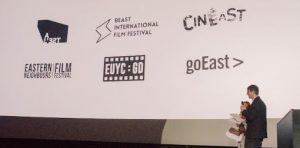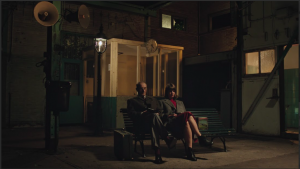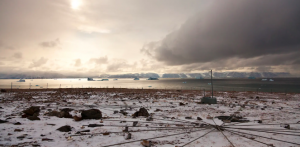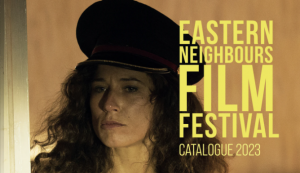
The Stone Speakers
| Director | Igor Drljaca |
| Producer | Igor Drljaca, Albert Shin – Timelapse Pictures |
| Writer | Igor Drljaca |
| Editor | Igor Drljaca |
| Camera | Amel Djikoli |
| Sound | Aaron Mirkin |
| Screening | Sunday 10 November | 14:30 hours | Filmhuis Den Haag |
| Original Title | KAMENI GOVORNICI |
| Year | 2018 |
| Length | 92 min |
| Country | Canada, Bosnia and Herzegovina |
| Subtitles | English |
| Section | Documentaries Open Debates Focus: Cinema by Migrants, Cinema on Migrants |
This visually superb, poetic, and thought-provoking documentary examines the cross points between tourism and ideology in four post-war Bosnia and Herzegovinian towns. This film by Sarajevo born director who now lives in Canada, was screened at Berlinale 2019. Dutch Premiere
Synopsis
Present-day Bosnia and Herzegovina is a country still affected by the civil war in the early 90’s. The Bosnian economy never recovered and the country remains divided. In order to cope, many towns have transformed themselves into unique tourist destinations that bring together history, religion, politics and folklore. The tourist sites promoted are not only a reflection of peopleʼs attempts to make a livelihood, but are also a means to promote and establish contradicting versions about the countryʼs past, present and future. ‘’The Stone Speakers’’ explores the cities of Medjugorje, Tuzla, Visoko and Visegrad through their tourism, slowly unravelling these competing narratives.
Festivals & Awards (selection)
Toronto International Film Festival, 2018 – World Premiere | Berlin International Film Festival, 2019 – Forum | Vancouver International Film Festival, 2018 | ZagrebDOX, 2019 | Beldocs, 2019 | goEast, Wiesbaden 2019 | DokuFest Prizren, 2019
Director’s bio
Born in Sarajevo, Bosnia and Herzegovina, Igor Drljača completed his Masterʼs in Film Production at York University’s graduate program in 2011. He is the recipient of the Ontario Art Council’s K.M. Hunter artist award for media arts in 2014. His award winning shorts include Woman in Purple (2010), and The Fuse: or How I Burned Simon Bolivar (2011), which have screened at hundreds of festivals, including: South by Southwest, Toronto, Telluride, Tampere, Palm Springs Shortfest, Vancouver and Melbourne. In 2013, The Fuse was nominated as best short documentary at the Canadian Screen Awards. His critically acclaimed debut feature Krivina (2012) premiered at TIFF and had its international premiere at Rotterdam. He co-produced Albert Shinʼs In Her Place (2014), which received 7 CSA nominations, including best picture. His sophomore feature The Waiting Room (2015) premiered at Locarno International Film Festival, and had its North American premiere at TIFF. It was nominated for 2 CSA’s in 2016. His first feature documentary, The Stone Speakers will be released this fall, while his third fiction feature, Tabija which received Rotterdam’s Cinemart Eurimages Prize and was part of the Cannes LʼAtalier program, is currently in pre-production.
Director’s statement
Today’s Bosnia-Herzegovina was created through the Dayton Peace Accords, which ended the civil war in the 1990s. The Accords enshrined the division of Bosnia’s population into three primary ethnic groups: Bosniaks, Serbs, and Croats. The process of ethnic cleansing during the war has also ensured that these groups largely live apart, with only some areas of the country retaining its pre-war multi-ethnic character. Little progress has been made since the war to address these divisions, and the country remains economically and socially unstable. Bosnia’s problems are worsening: it has the most severe unemployment rate in Europe (44%), and its population is constantly declining. The one bright spot is the country’s rapidly growing tourism industry. Bosnia’s unspoiled natural sites, and its rich history, have begun to attract tourists from all parts of the world. But the cultivation of the country’s tourist industry has not been immune to persisting divisions. Some of these tourist sites perpetuate competing narratives in curious ways, many of which can appear eccentric to outsiders. These eccentricities help to mask the ultimately perilous nature of the narratives perpetuated, as they continue to erode Bosnia’s fragile peace. While the film was being made, events around the globe have increasingly become characterized by similar efforts to write and rewrite facts and history. Where Bosnia once stood out for its eccentricities, it can now bizarrely appear to be at the vanguard of a more global destabilizing movement, one which questions our deeply held beliefs about truth and fiction, right and wrong, and exclusion and belonging.









